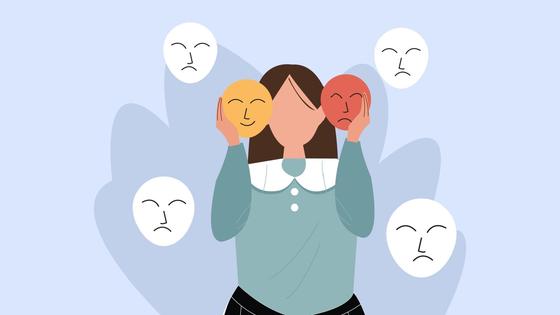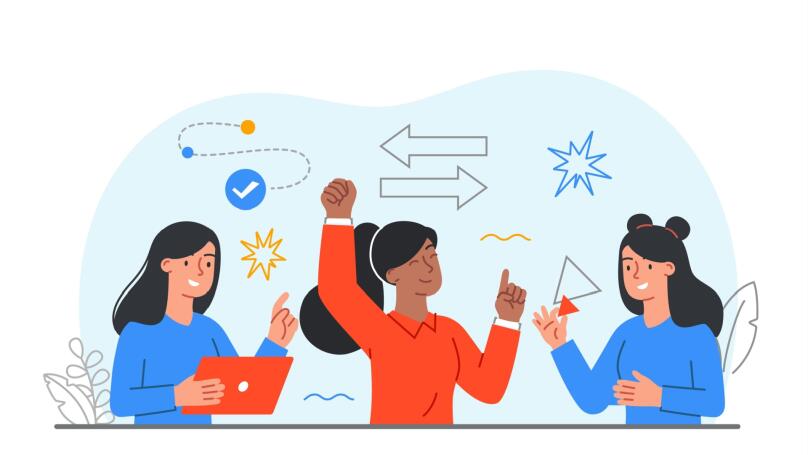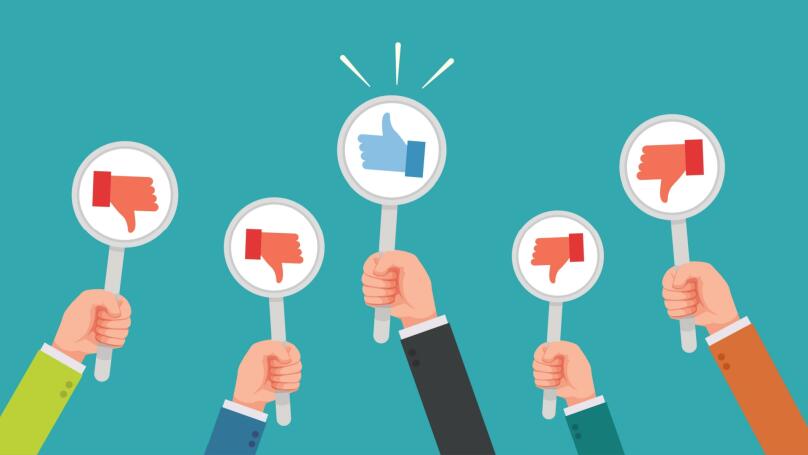Don’t Get Angry! What to Do if You Are Overwhelmed With Emotions at Work
All of us have experienced irritation at work at least once — due to constant communication with clients, demanding deadlines, and a wayward boss.

Sometimes, the team itself can also provide reasons for anger. Emotions make people human, and it's foolish to deny that they affect all our lives, including work. It's impossible to separate one from the other, so it's essential to experience emotions properly and control them so they don't control you.
Anger and malice are not the only negative emotions you may experience at work, but they are, according to statistics, the ones modern professionals go through most often. Rage is the most challenging to control in comparison to depression, sadness, or envy. All because it puts us in a state of "fight or flight" and fear. Have you ever felt the urge to clench your fists in anger or punch something? That's because, at such times, our body dramatically releases the hormones norepinephrine and cortisol into the bloodstream, thus assuming a combat-ready position.
In psychological terms, however, anger consists of three successive components that always attach to us one after another:
- The thought that we have been wronged. Some events, words, or actions can be interpreted as a threat, an attempt on our safety, well-being, etc. It is typically the trigger.
- A physiological response to a threat. There is the desire to clench fists. The heartbeat speeds up, the face starts to sweat and turn red, etc. All this results from releasing the hormones mentioned above and the body's "transition" to self-defence mode.
- Attacking reaction. It includes physical attack (we hope you do not rush at your colleague with fists) and verbal manifestations of aggression, such as initiating an argument or even insults.
It is best to stop negative emotions (not only anger; other feelings are "included" by analogy) at the first stage when the very thought of a threat or offence appears. Suppose you have already taken the necessary actions to manage emotions. In that case, you can prevent the second and third components from joining, or at least avoid their destructive consequences for your life and career.
"First Aid" for Managing Negative Emotions: Practical Tips

Whatever caused your negative emotions, the self-regulation action plan is always the same.
Don't ignore or lock up your emotions
The first and most important thing you must realise is that you have every right to experience emotions - yes, these, too - no matter how negative or destructive they may be. Many problems with emotional regulation come from childhood when parents forbade us to cry, be cranky, throw toys out of the pram, etc. In short, they forbade us to show what we feel because it is shameful, wrong, and disturbs others. This is why people often cannot recognise their emotional needs and express them correctly. Furthermore, negative emotions, especially fear and anger, signal that something is going pear-shaped, and we need something.
So, when you feel an unpleasant emotion, don't try to push it away or suppress it with reason and "grown-up" behaviour. Instead, listen to your body: where exactly are you experiencing this emotion? How is it manifesting itself? It could be that rapid heartbeat, the twitching of your hands, the trembling in your legs. Then, try to name what you are feeling and describe it in words. Sometimes, the emotions we go through are false and actually mask some other, more complex, unfamiliar feeling. If you're unsure you fully understand the feeling, go straight to the next step.
Identify your irritants and needs
Understanding what irritates you, at what point it started happening, and what need lies beneath it all that is being hurt by what is happening is a primary key to controlling your emotions. Pay attention to your environment and your conditions when you feel the emotion. What changed in that very moment around you? What preceded the occurrence of that feeling?
After that, go back to the description of your emotion, and now try to get to the need that lurks underneath. For example, you lost your temper after a colleague got praised for a job you did and not you. There is clearly a need for recognition, and perhaps better remuneration and working conditions (if you receive a bonus for your work, for example). The situation wouldn't have caused such strong negative emotions if you didn't have these needs. You would let it go and continue doing your job. Thus, finding the need and detecting alternative ways to close it is essential - then the emotion will disappear. For example, tell your boss that you did the task, not your colleague.
Important! Don't use alternative ways to close the need until you have completed the entire "first aid" plan for managing emotions. It is vital to implement these methods calmly and, having analysed different scenarios regarding risks and prospects in advance, to choose the most appropriate one. For instance, it may not always be the best way to talk to your boss directly - it depends on the personality of your manager and your relationship. It might be better to speak to your colleague directly and ask them to correct the misunderstanding independently.

Interrupt automatic thoughts with action
Every time we experience negative emotions, we trigger a stream of automatic thoughts. Take the same situation with a colleague and undeserved praises as an example. Here, a thought such as "I am not good enough to even lay claim to my work," "I am not seen/respected," "The colleague and boss hate me," etc. may appear. Therefore, these automatic thoughts tend to come from cognitive thinking errors like dichotomies or double stereotypes and are intensely rooted. You can't get rid of them so quickly, and it's natural to experience these thoughts, too (everyone has them, just different types). That's why the most effective thing you can do with these thoughts is not to try to stop them and convince yourself that they are unrealistic and are just your distorted perception of reality (although they are). The most effective thing to do is to displace the thought process with physical activity.
We often want to run out of the room where the quarrel happened, drop everything, and go outside. It will sound strange, but do it! It is not the body that follows the thoughts, but the thoughts follow the body. If you go outside and start running laps around the house, the negative emotion will pass much faster because your brain will willy-nilly switch to a physical task. Ideally, this task should not be a chore, so your brain will work and switch over more quickly. Try doing something you don't normally do. That is, don't just walk here and there, but eat, for example, a chocolate bar with nuts, call a friend and ask her how she's doing, hang on the crossbar in the yard for a while, or do some push-ups. Please pay attention to the surrounding smells, the temperature of the air, the sounds, and the sensations you feel while doing it. It is best to choose physical activity because anger, like fear, is a highly active emotion accumulating a large reserve of energy. If it does not get an outlet, it will aggravate your emotional state.
So, your main task in this step is to force yourself to "swim out" of the repetitive thoughts into the real world and engage in a process that does not cause negativity. A sharpened mindfulness skill, by the way, helps a lot with this!
Important! Using meditative and breathing exercises, if you have never practised them before (or practice them rarely), in a state of anger can provoke even more irritation and negative impressions of meditation. Therefore, it is safer and more effective to pick other ways of neutralising negative emotions that are more "down-to-earth" and easier to do.
Remember or find an example to follow
Make it a habit to pay attention to how other people react to adverse situations and experience emotions. Firstly, this will help you improve your empathy and understand other people better, reducing the risk of interpersonal conflicts. Secondly, you can adopt someone's behaviour model or exciting techniques in stressful situations. It does not necessarily have to be a person you know personally - characters from a film or cartoon series will work, too! Observing the world around you helps develop many skills, including emotional intelligence, which is the basis of emotional regulation.
What Do You Do if the Cause of Negative Emotions Is Another Person?

Most often, the cause of our negative emotions is another person. It can be either an ill-mannered client who has been rude to you early in the morning or a colleague who was late for work again or drank from your mug without asking. As mentioned above, it is essential to understand what need underlies your anger, what provoked it and under what circumstances it arose. Only in this way can you effectively build further communication with this person and find a solution to the problem. It is also advisable to carry out the whole "first aid" plan before returning to communication, but in any case, you should:
- Decide whether you need to continue the communication here and now. Would it be appropriate to talk about the situation that caused your negative experience? Does the other person want to do this?
- Clearly articulate your thoughts and find the right words to describe your feelings. Moreover, it is essential to convey your feelings! Adults often avoid this, fearing ridicule or simply having a habit of going through everything alone (which also often comes from childhood). However, telling the other person about your anger, fear, or sadness is the key to neutralising negative emotions and experiencing them more easily in the future.
- Prepare a scenario for solving the issue that will suit both of you and help you avoid repeating the unpleasant situation. To do this, determine what you want to get from the person. Apology? Approval? Acceptance of your position or some of its points? What can a person do to make you feel better? Of course, it is necessary to consider that negative emotions may have arisen in your interlocutor, too, and they may also be trying to gain something from you.
In any conflict where two parties are involved, there are only four possible stances:
- "I'm good, and you are good too." It is the position you should strive for because only in this way will your dialogue be constructive, and you can compromise and eliminate the cause of negative emotions.
- "I'm right, and you're wrong." There is no point in talking if you or the interlocutor take this position. In this case, it is better to focus on eliminating your negative emotions by your efforts and finding alternative scenarios to solve the problem.
- "You're right, and I made a mistake." Many people mistakenly believe they can avoid conflict if they give in to the situation. It may be accurate, but the negative emotions will remain, and the situation will reoccur.
- "We are both wrong." It is also the wrong position, as it encourages the accumulation of irritation and negative emotions in both, rather than their constructive outlet.
To determine how to behave in a situation where the cause of your anger is the other person, it is also essential to clarify for yourself right away whether you want to maintain a good relationship with them. For example, if it is a regular client or business partner, the situation should be resolved (at least to preserve your reputation). If the result of the conflict is not that important for you, then aim to eliminate negative emotions - that's all. As you already know, you need to identify and close the affected need.
A high level of Emotional Intelligence (EI, or EQ) helps to effectively cope with pronounced negative emotions and resolve any situations and conflicts that provoke their occurrence. It includes empathy, i.e., the ability to empathise and understand other people's emotions, stress management and the skill of tracking and managing one's inner state. Given the tense and competitive market, it is a must-have for a modern specialist, regardless of profession. But EI is even more significant for team leaders and business owners. You can boost your Emotional Intelligence level with the "Emotional Intelligence. Becoming Happier and Faster To Succeed" course, where you will study the biochemical component of feelings, explore mindfulness tools and get 10+ exercises to manage anger and other emotions.
Lectera’s Online Courses by topic
Share this with your friends via:
Latest News

A significant stage in the development of the alternative education system has begun in West Northamptonshire in the UK: the County Council is actively calling on parents, guardians, and trustees to participate in shaping the future of this key area.

Outwoods Primary School in Atherstone, Warwickshire, having experienced deep sadness after the loss of their famous cat, Silla, has found solace in a new pet – a Maine Coon named Aloysius O’Hara.

In modern universities, artificial intelligence, and in particular ChatGPT, is rapidly transforming from a controversial tool into a full-fledged student assistant.

An innovative educational project is gaining momentum in UK primary schools, aiming to change attitudes towards video games.

The Massachusetts Institute of Technology (MIT) presents MIT Learn – a revolutionary online platform that opens a “new front door” to access university knowledge and resources.












 “I’m Here for the Long Haul”: When Loyalty to a Company Becomes Toxic
“I’m Here for the Long Haul”: When Loyalty to a Company Becomes Toxic
 Freelancing, Remote Work, Office Jobs, or Consulting: How to Choose the Work Format That’s Right for You
Freelancing, Remote Work, Office Jobs, or Consulting: How to Choose the Work Format That’s Right for You
 Test: How Prone Are You to Abusive Behavior as a Manager?
Test: How Prone Are You to Abusive Behavior as a Manager?
 Test. What superpower would you possess if you were a superhero?
Test. What superpower would you possess if you were a superhero?
 Test. What Should You Let Go of Before Winter Ends?
Test. What Should You Let Go of Before Winter Ends?
 Test. Which Ritual Should You Start Practicing This Winter?
Test. Which Ritual Should You Start Practicing This Winter?
